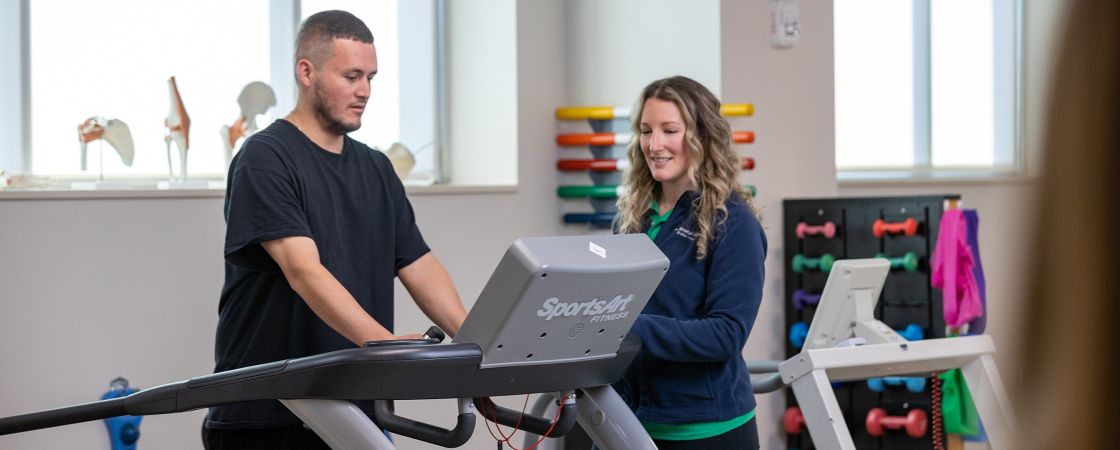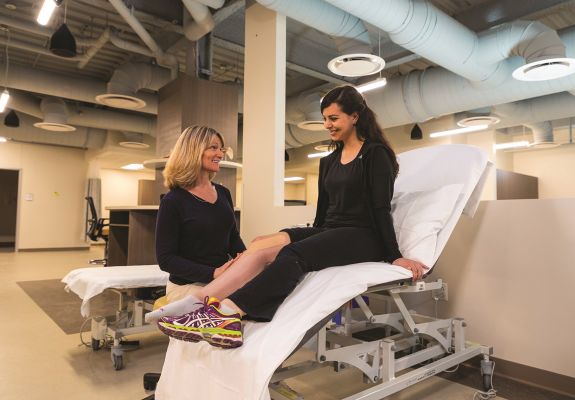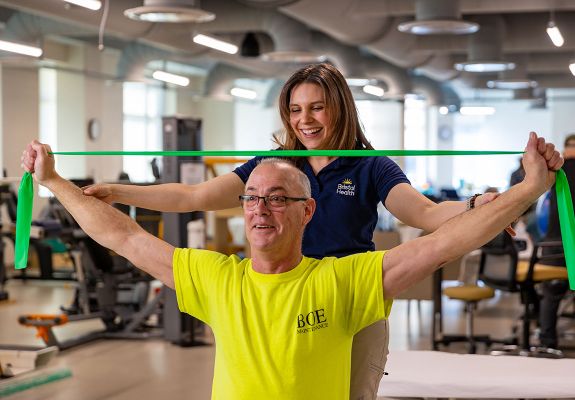Athletics and injuries go hand-in-hand. This treatment zeros-in on your injury to get you back on the field.
Injuries in your active life can heal faster and stronger with the help of a physical therapist specifically trained in musculoskeletal injuries occurring from sports activities. Whether your physician recommends surgery or not, our physical therapists are here to help you achieve your goals.
Services We Provide
- Aquatic Therapy
- Aquatic therapy is made up of an exercise program performed in water, carries many benefits, and is used to rehab a variety of injuries and medical conditions. The viscosity of water provides natural resistance while its buoyancy assists in supporting weight therefore putting less stress on joints.
- Surgical Recovery
- Whether it's ACL surgery, rotator cuff surgery, or any in between, rehabilitation post-procedure is an important step in your recovery. Our physical therapists work closely with both you and your doctor to make sure your rehab meets the appropriate goals.
Our Centers
Our centers are designed to provide an optimal environment with high-quality tools and training equipment to restore you to your desired level. Our center includes but is not limited to:
- Therapy pool at Malone Aquatics Center
- Electrical Muscle Stimulation
- Exercise bikes
- Exercise balls
- Resistance Equipment
An exercise-based program aimed at improving balance and reducing problems with vertigo, dizziness and other inner ear/balance related symptoms.
Is dizziness impacting your life? If so, you’re not alone. More than 69 million people have experienced vestibular dysfunction at some point in their lives. Vestibular therapy - an exercise-based program, designed by a specialty-trained vestibular physical therapist, to improve balance and reduce problems related to dizziness - can aid in controlling symptoms, reducing falls, and improving your overall quality of life. Vestibular issues are often caused by a disorder of the inner ear, neck dysfunction, or another condition. Special evaluation techniques are used to determine your specific need.
Common Symptoms of Vestibular Disorders
Most adults living with a vestibular disorder go undiagnosed and never receive treatment. As a result, their quality of life and ability to perform both routine and unique activities have been diminished. Patients suffering from vestibular disorders often experience:
- Dizziness or blurry vision with head movements
- Neck tightness, stiffness, and/or pain
- Imbalance or the need to hold onto objects when walking
- Headaches
- Frequent falls
- Generalized “dizziness, wooziness, and foggy head” feelings
- Vertigo/spinning
Treatment Exercises
Examples of exercises you may learn during therapy sessions include:
- Vision stability training
- Posture training
- Stretching and strengthening exercises
- Balance retraining
- Walking exercises
- Neck mobility/stretching exercises
- General fitness exercises
- Ergonomic training (This advice is given so that workplace furnishings can be adjusted to improve a person’s posture and decrease any discomforts.)
Recovery/Outcomes
Expected vestibular rehabilitation outcomes include:
- Decreased risk of falling
- A decrease in dizziness symptoms
- Improved balance
- Improved ability to stabilize vision/gaze
- Increased body strength
- Return to prior level of movement/function
- Increase in confidence in ability to maintain balance
- Improved neck motion, reduced symptoms
Reserved for our breast health patients, treatment is focused on reducing the swelling and controlling the pain caused by our body’s collection of too much lymph fluid.
Reserved for our breast health patients.
Lymphedema refers to swelling that can occur in any part of the body. While it typically affects just one arm or leg, sometimes both arms or both legs may be swollen. Lymphedema is caused by a blockage in your lymphatic system, an important part of your immune and circulatory systems. The blockage prevents lymph fluid from draining as needed, and as the fluid builds up, the swelling continues. Through a comprehensive treatment program, our team can help drastically reduce the pain caused by lymphedema. Treatment techniques can decrease the size of your affected body part so you can be more active and more comfortable.
Symptoms of Lymphedema
- Swelling of part of your arm or leg or your entire arm or leg, usually starting in your fingers or toes
- A feeling of heaviness or tightness in your arm or leg
- Restricted range of motion in your arm or leg
- Aching or discomfort in your arm or leg
- Recurring infections in your affected limb
- Hardening and thickening of the skin on your arm or leg
Cancer and Lymphedema
Cancer treatment and the removal of lymph nodes are often a cause of Lymphedema and can occur shortly after surgery or take up to three years post-surgery. Radiation therapy is also a known cause, as is a blockage of the lymph nodes and or lymph vessels by the cancer. Lymphedema often occurs in breast cancer patients.
What Can You Do if You Already Have Lymphedema?
To help decrease the risk of further swelling, continue following the recommendations for preventing lymphedema listed above. In addition:
- Avoid extreme temperature changes. Do not use hot tubs, whirlpools, saunas, or steam baths. Use warm, rather than very hot, water when bathing or washing dishes.
- Always wear sun protection (at least SPF 15) when going outdoors.
- When traveling by air, ask your healthcare provider if you should wear a compression sleeve on your affected arm or a stocking on your affected leg to minimize swelling. For long flights, additional bandages may be needed. Talk to your healthcare provider before traveling.
- Continue to see your healthcare provider for frequent follow-up visits, as recommended.
Developed to meet the specific needs of individuals of all genders and ages, with a focus on addressing Pelvic Floor Dysfunction.
Millions of people around the country suffer from pelvic floor dysfunction, oftentimes as a result of pregnancy, childbirth, constipation, chronic coughing, surgery or routine aging. Our physical therapists possess advanced training in specialized pelvic health assessment and treatment.
What is Pelvic Floor Dysfunction?
Pelvic floor dysfunction is the inability to control the muscles of your pelvic floor.
Your pelvic floor consists of a group of muscles and ligaments in your pelvic region, acting like a sling to support the organs in your pelvis which include the bladder, rectum and uterus or prostate.
Symptoms
Examples of symptoms that may indicate you have pelvic floor dysfunction include:
- Constant urge to urinate
- Painful urination
- Constipation
- Lower back pain
- Pain in pelvic region, genitals or rectum
- Muscle spasms in pelvic region
- Discomfort during sexual intercourse
Treatment
The goal of treatment is to provide you with more control over your pelvic muscles.
Kegel exercises are a common technique used to treat the condition. Medication and surgery are also options.


